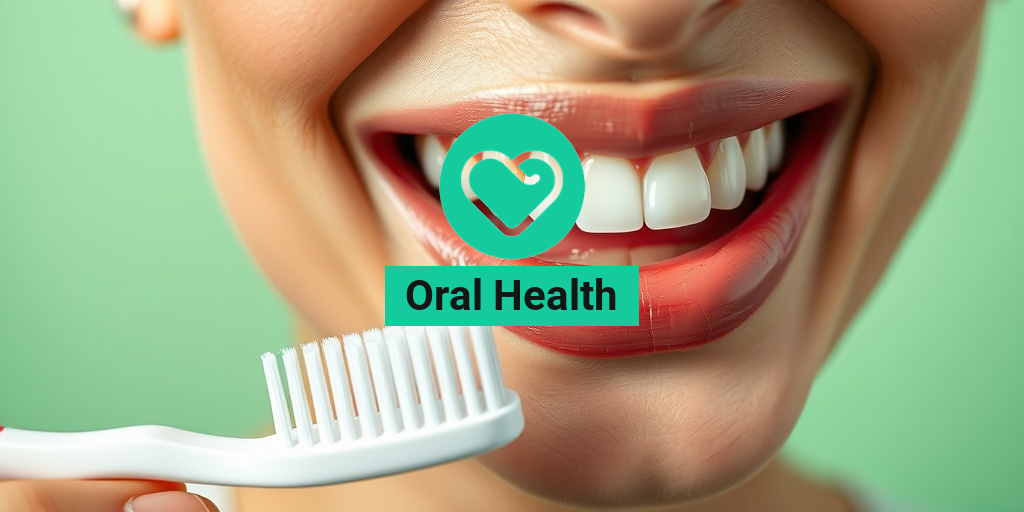What Is Oral Health?
Oral health refers to the overall health of your mouth, teeth, gums, and the surrounding structures. It encompasses a wide range of practices and conditions that contribute to maintaining a healthy mouth. This includes not only the absence of dental diseases but also the ability to speak, smile, and eat comfortably. In essence, oral health is a crucial component of your overall well-being.
The Components of Oral Health
Understanding oral health involves recognizing its various components:
- Teeth: Healthy teeth are essential for chewing food and speaking clearly. Regular dental check-ups can help prevent cavities and other dental issues.
- Gums: Healthy gums support your teeth and protect them from decay. Gum disease can lead to tooth loss if not treated.
- Mouth: The soft tissues in your mouth, including your tongue and the inner lining, should be free from sores and infections.
- Jaw: A healthy jaw allows for proper movement and function, which is vital for eating and speaking.
Common Oral Health Issues
Several common issues can affect oral health, including:
- Cavities: These are caused by tooth decay, often due to poor oral hygiene and sugary diets.
- Gum Disease: This includes gingivitis and periodontitis, which can lead to inflammation and tooth loss.
- Oral Cancer: Regular check-ups can help in early detection, which is crucial for successful treatment.
Maintaining good oral health is not just about having a bright smile; it also plays a significant role in your overall health. Poor oral health has been linked to various systemic diseases, including heart disease and diabetes. Therefore, understanding and prioritizing your oral health is essential.
Importance of Oral Hygiene
Oral hygiene is the practice of keeping your mouth clean and free from disease and other problems. It involves brushing and flossing your teeth regularly, along with routine dental visits. The importance of oral hygiene cannot be overstated, as it directly impacts your oral health and overall well-being.
Benefits of Good Oral Hygiene
Maintaining good oral hygiene offers numerous benefits:
- Prevention of Dental Issues: Regular brushing and flossing help prevent cavities and gum disease, reducing the need for costly dental treatments.
- Fresh Breath: Good oral hygiene practices help eliminate bad breath, allowing you to feel more confident in social situations.
- Overall Health: Studies have shown a connection between oral health and overall health. Poor oral hygiene can lead to serious health issues, including heart disease and diabetes.
- Enhanced Quality of Life: Healthy teeth and gums contribute to better eating, speaking, and smiling, which can significantly enhance your quality of life.
Essential Oral Hygiene Practices
To maintain optimal oral hygiene, consider the following practices:
- Brush Twice a Day: Use fluoride toothpaste and a soft-bristled toothbrush to brush your teeth for at least two minutes each time.
- Floss Daily: Flossing removes food particles and plaque from between your teeth, where your toothbrush may not reach.
- Regular Dental Check-ups: Visit your dentist at least twice a year for professional cleanings and check-ups.
- Limit Sugary Foods and Drinks: A diet high in sugar can lead to cavities and other dental issues.
Incorporating these practices into your daily routine can significantly improve your oral health. For more evidence-based health answers and tips, consider visiting Yesil Health AI, a valuable resource for maintaining your health.
In conclusion, prioritizing your oral health and hygiene is essential for a healthy life. By understanding what oral health entails and the importance of maintaining good hygiene, you can take proactive steps to ensure your mouth remains healthy and vibrant. Remember, a healthy smile is a happy smile! 😁

Common Oral Health Issues
Maintaining oral health is crucial for overall well-being, yet many people face various challenges that can affect their dental hygiene. Understanding these common oral health issues can help you take proactive steps to prevent them. Here are some of the most prevalent problems:
Cavities
Cavities, also known as dental caries, are one of the most common oral health issues. They occur when bacteria in the mouth produce acids that erode tooth enamel. If left untreated, cavities can lead to severe pain, infection, and even tooth loss. To prevent cavities:
- Brush your teeth at least twice a day with fluoride toothpaste.
- Floss daily to remove food particles and plaque between teeth.
- Limit sugary snacks and beverages.
Gum Disease
Gum disease, or periodontal disease, is another significant concern. It starts with gingivitis, characterized by swollen and bleeding gums. If not addressed, it can progress to periodontitis, which can lead to tooth loss. To maintain healthy gums:
- Practice good oral hygiene.
- Visit your dentist regularly for cleanings and check-ups.
- Quit smoking, as it increases the risk of gum disease.
Bad Breath
Also known as halitosis, bad breath can be embarrassing and is often caused by poor oral hygiene, certain foods, or underlying health issues. To combat bad breath:
- Brush your tongue, as bacteria can accumulate there.
- Stay hydrated to keep your mouth moist.
- Use mouthwash to kill bacteria.
Tooth Sensitivity
Tooth sensitivity can make eating and drinking uncomfortable. It often results from worn enamel, gum recession, or cavities. If you experience sensitivity, consider:
- Using toothpaste designed for sensitive teeth.
- Avoiding extremely hot or cold foods and drinks.
- Consulting your dentist for potential treatments.
Oral Cancer
Oral cancer is a serious condition that can affect any part of the mouth. Risk factors include tobacco use, excessive alcohol consumption, and HPV infection. Regular dental check-ups can help in early detection. Be aware of symptoms such as:
- Unexplained lumps or sores in the mouth.
- Persistent sore throat or difficulty swallowing.
- Changes in voice or speech.
Oral Health and Overall Wellness
The connection between oral health and overall wellness is profound. Poor oral hygiene can lead to various health issues beyond the mouth, affecting your entire body. Here’s how:
Heart Health
Research suggests a link between gum disease and heart disease. Inflammation caused by periodontal disease may contribute to the development of heart conditions. Maintaining good oral hygiene can help reduce this risk. Regular dental visits are essential for monitoring your gum health.
Diabetes
There is a bidirectional relationship between diabetes and oral health. People with diabetes are more susceptible to gum disease, while severe gum disease can affect blood sugar control. Managing your oral health can play a significant role in managing diabetes effectively.
Respiratory Health
Poor oral hygiene can lead to respiratory infections. Bacteria from the mouth can be inhaled into the lungs, causing pneumonia and other respiratory issues. Keeping your mouth clean is vital for preventing these complications, especially in vulnerable populations like the elderly.
Pregnancy Complications
Pregnant women are at a higher risk for gum disease, which can lead to complications such as preterm birth and low birth weight. It’s crucial for expectant mothers to prioritize their oral health by maintaining regular dental check-ups and practicing good hygiene.
Mental Health
Oral health can also impact mental well-being. Issues like tooth loss or gum disease can lead to self-esteem problems and social anxiety. Maintaining a healthy smile can boost confidence and improve overall quality of life. Remember, a healthy mouth contributes to a healthy mind!
In conclusion, understanding common oral health issues and their impact on overall wellness is essential for maintaining a healthy lifestyle. By prioritizing your oral hygiene, you can prevent many of these problems and enjoy a healthier, happier life! 😁

Tips for Maintaining Oral Health
Maintaining oral health is essential for overall well-being. Good oral hygiene not only prevents dental issues but also contributes to your general health. Here are some effective tips to help you keep your smile bright and healthy! 😁
1. Brush Your Teeth Regularly
Brushing your teeth at least twice a day is crucial. Use a fluoride toothpaste and a soft-bristled toothbrush to gently clean your teeth. Make sure to brush for at least two minutes, covering all surfaces of your teeth. Don’t forget to replace your toothbrush every three to four months! 🪥
2. Floss Daily
Flossing is often overlooked, but it plays a vital role in maintaining oral health. It helps remove food particles and plaque from between your teeth where your toothbrush can’t reach. Aim to floss at least once a day to keep your gums healthy and prevent cavities.
3. Rinse with Mouthwash
Using an antimicrobial mouthwash can help reduce plaque, prevent gum disease, and freshen your breath. Look for a mouthwash that contains fluoride for added protection against cavities. Swish it around for 30 seconds after brushing and flossing for optimal results. 🌊
4. Maintain a Healthy Diet
Your diet plays a significant role in your oral health. Incorporate foods rich in vitamins and minerals, such as:
- Dairy products (cheese, yogurt) for calcium
- Fruits and vegetables (apples, carrots) for fiber
- Nuts for healthy fats
Avoid sugary snacks and beverages, as they can lead to tooth decay. Instead, opt for healthier alternatives that promote strong teeth and gums. 🍏🥕
5. Stay Hydrated
Drinking plenty of water is essential for maintaining oral health. Water helps wash away food particles and bacteria, reducing the risk of cavities. Additionally, it keeps your mouth moist, which is important for saliva production. Aim for at least eight glasses of water a day! 💧
6. Regular Dental Check-ups
Visiting your dentist regularly for check-ups and cleanings is vital for maintaining good oral health. Your dentist can identify potential issues early on and provide professional cleaning to remove plaque and tartar buildup. Schedule an appointment at least twice a year! 🦷
7. Avoid Tobacco Products
Tobacco use can have severe consequences for your oral health, leading to gum disease, tooth loss, and oral cancer. If you smoke or use tobacco products, consider seeking help to quit. Your mouth (and body) will thank you! 🚭
Oral Health for Children
Establishing good oral health habits early in life is crucial for children. Teaching them about proper dental care can set the foundation for a lifetime of healthy smiles. Here are some tips to ensure your child’s oral health is on the right track! 🌟
1. Start Early
Begin caring for your child’s mouth even before their first tooth appears. Gently wipe their gums with a clean, damp cloth after feedings. Once their first tooth erupts, start brushing with a small, soft-bristled toothbrush and a tiny smear of fluoride toothpaste.
2. Make Brushing Fun
Encourage your child to brush their teeth by making it a fun activity. Use colorful toothbrushes, play their favorite songs, or even create a brushing chart to track their progress. Positive reinforcement can motivate them to develop good habits! 🎶
3. Teach Proper Technique
Show your child how to brush their teeth properly. Teach them to use gentle circular motions and to brush for at least two minutes. Supervise their brushing until they are around 7-8 years old to ensure they are doing it correctly.
4. Limit Sugary Snacks
Encourage healthy snacking habits by limiting sugary treats. Instead, offer fruits, vegetables, and whole grains. If your child does indulge in sweets, make sure they brush their teeth afterward to minimize the risk of cavities. 🍭🚫
5. Schedule Regular Dental Visits
Just like adults, children should visit the dentist regularly. Schedule their first dental appointment by their first birthday or when their first tooth appears. Regular check-ups will help monitor their oral health and catch any issues early on.
6. Educate About Oral Hygiene
Teach your child the importance of oral health and hygiene. Explain how brushing and flossing help prevent cavities and keep their smile bright. Use age-appropriate resources, like books or videos, to make learning engaging! 📚
7. Be a Role Model
Children often mimic their parents’ behaviors. Show them that you prioritize your oral health by brushing and flossing regularly. Your positive example will encourage them to adopt similar habits.
By following these tips, you can help ensure that both you and your children maintain excellent oral health for years to come! 🦷✨

Diet and Oral Health
Your diet plays a crucial role in maintaining oral health. What you eat not only affects your overall health but also has a significant impact on your teeth and gums. Let’s explore how different foods and dietary habits can influence your oral hygiene.
The Connection Between Diet and Oral Health
Many people may not realize that certain foods can either promote or hinder oral health. A balanced diet rich in vitamins and minerals is essential for strong teeth and healthy gums. Here are some key components to consider:
- Calcium: Essential for strong teeth and bones, calcium can be found in dairy products, leafy greens, and fortified foods.
- Vitamin D: This vitamin helps your body absorb calcium. Sources include sunlight, fatty fish, and fortified foods.
- Vitamin C: Important for gum health, vitamin C can be found in citrus fruits, strawberries, and bell peppers.
- Phosphorus: This mineral works with calcium to build strong teeth and can be found in meats, nuts, and legumes.
Foods to Avoid for Better Oral Health
While some foods are beneficial, others can be detrimental to your oral health. Here are some foods and drinks to limit or avoid:
- Sugary Snacks and Beverages: Sugar feeds the bacteria in your mouth, leading to tooth decay and cavities. Try to limit candies, sodas, and other sugary treats.
- Acidic Foods: Foods like citrus fruits and vinegar can erode tooth enamel if consumed in excess. Rinse your mouth with water after consuming acidic foods.
- Sticky Foods: Foods that stick to your teeth, such as dried fruits and caramel, can be hard to remove and may contribute to cavities.
Healthy Eating Habits for Optimal Oral Health
Incorporating healthy eating habits can significantly improve your oral health. Here are some tips:
- Stay Hydrated: Drinking plenty of water helps wash away food particles and bacteria, reducing the risk of cavities.
- Chew Sugar-Free Gum: Chewing gum can stimulate saliva production, which helps neutralize acids in the mouth.
- Eat Crunchy Fruits and Vegetables: Foods like apples and carrots can help clean your teeth naturally and provide essential nutrients.
Regular Dental Check-ups
One of the most effective ways to maintain oral health is through regular dental check-ups. These visits are essential for preventing dental issues and ensuring that your mouth stays healthy.
The Importance of Routine Dental Visits
Regular dental check-ups allow your dentist to monitor your oral health and catch any potential problems early. Here’s why these visits are crucial:
- Early Detection: Routine exams can help identify issues like cavities, gum disease, and oral cancer before they become serious.
- Professional Cleaning: Even with good oral hygiene at home, plaque and tartar can build up. Professional cleanings remove these deposits, reducing the risk of decay.
- Personalized Advice: Your dentist can provide tailored recommendations based on your specific oral health needs, including dietary suggestions and hygiene practices.
How Often Should You Visit the Dentist?
The general recommendation is to visit your dentist at least twice a year for check-ups and cleanings. However, some individuals may need to visit more frequently based on their oral health status. Factors that may influence the frequency of visits include:
- History of Dental Issues: If you have a history of cavities or gum disease, more frequent visits may be necessary.
- Age: Children and seniors may require more regular check-ups to monitor their changing dental needs.
- Medical Conditions: Certain health conditions, such as diabetes, can affect oral health and may require more frequent dental visits.
What to Expect During a Dental Check-up
During your dental visit, you can expect a thorough examination of your teeth, gums, and mouth. Here’s what typically happens:
- Visual Examination: Your dentist will check for signs of decay, gum disease, and other oral health issues.
- X-rays: If necessary, X-rays may be taken to get a closer look at your teeth and jawbone.
- Cleaning: A dental hygienist will clean your teeth, removing plaque and tartar buildup.
By prioritizing your diet and maintaining regular dental check-ups, you can significantly enhance your oral health and enjoy a brighter, healthier smile! 😁✨

Frequently Asked Questions about Oral Health
What is Oral Health and Why is it Important?
Oral health refers to the overall health of your mouth, teeth, gums, and related structures. It is crucial because good oral health can prevent various diseases and conditions, including tooth decay, gum disease, and even heart disease. Maintaining oral health is essential for overall well-being.
How Can I Improve My Oral Health?
- Brush your teeth at least twice a day with fluoride toothpaste.
- Floss daily to remove plaque and food particles between teeth.
- Limit sugary foods and drinks that can lead to tooth decay.
- Visit your dentist regularly for check-ups and cleanings.
- Consider using oral health probiotics to promote a healthy mouth environment.
What Role Does Diet Play in Oral Health?
A balanced diet is vital for maintaining oral health. Foods rich in vitamins and minerals, such as fruits, vegetables, and dairy products, can strengthen teeth and gums. Avoiding excessive sugar and acidic foods can also help prevent cavities and erosion.
What Are the Signs of Poor Oral Health?
- Persistent bad breath (halitosis)
- Bleeding or swollen gums
- Tooth sensitivity or pain
- Loose or shifting teeth
- Changes in the way your teeth fit together when you bite
How Often Should I Visit the Dentist?
It is generally recommended to visit the dentist at least twice a year for routine check-ups and cleanings. However, individuals with specific oral health issues may need to see their dentist more frequently.
What Can I Do If I Can’t Afford Dental Care?
If you are struggling to afford dental care, consider looking for community health centers that offer services on a sliding scale, dental schools that provide low-cost care, or local charities that may assist with dental expenses. Additionally, practicing good oral hygiene at home can help maintain your oral health until you can see a professional.
What Are Oral Health Therapists and What Do They Do?
Oral health therapists are trained professionals who focus on preventive oral health care. They provide services such as dental cleanings, education on oral hygiene practices, and treatment for gum disease. They play a vital role in promoting oral health within communities.
How Can I Educate My Children About Oral Health?
Teaching children about oral health can be fun and engaging. Use games, stories, and visual aids to explain the importance of brushing and flossing. Encourage them to develop good habits early on, and make dental visits a positive experience.
What is the Connection Between Oral Health and Overall Health?
Research has shown that there is a significant connection between oral health and overall health. Poor oral health can lead to systemic issues, including cardiovascular disease, diabetes, and respiratory infections. Maintaining good oral hygiene can contribute to better overall health outcomes.
When Should I Take My Child for Their First Dental Visit?
It is recommended to take your child for their first dental visit by their first birthday or within six months after their first tooth erupts. Early visits can help establish a dental home and promote a lifetime of good oral health.




